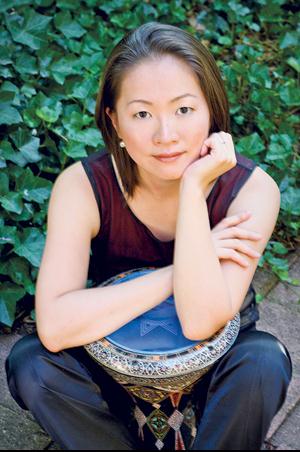The beat starts slowly, hypnotically, like a heart pulsing its way to life. It fills the body, massaging your spine, filling your torso with a warm rhythm that increases in speed and intensity. You’re carried along by this undeniable force, relaxing into the sureness of its embrace, even as you thrill to its power. It needs no other instrument. All it needs is a taut surface and a willing pair of hands. It is the drum.
The idea of a concert of percussion may seem a little foreign to some people. After all, it takes only one extended drum solo courtesy of a wannabe Whitesnake tribute band to fervently wish the tap-happy little buggers would just stay in the background where they belong. But for the true percussion artist, there is a whole world of music that has little to do with blazing guitars, power-rock vocals and the occasional inflatable bat (don’t think I don’t see you there, Alice Cooper).
“As a percussionist you can make so many different choices,” says Haruka Fujii, who will perform in Soundstream’s upcoming Fujii Percussion and Voices concert. “There are thousands of different mallets and stick choices, giving many different combinations of elements. It’s a little like Iron Chef, with all these different elements you’re cooking into the music.”
Fujii began honing her craft in Japan, where she was born. Brought up in a suburb of Tokyo, she quickly embraced life in the city’s metropolitan core after being accepted in the university’s music program. From there it was an even bigger move — both geographically and culturally — to New York, where she had been accepted into the prestigious Juilliard School’s music program.
“I didn’t really speak any English, but I had a base of a musical identity from my education in Japan. And the longer I play, and the more time I spend out of Japan, I realize my roots are still Japanese. There’s a strong musical identity that is different from others.”
When it comes to musical identity, Fujii certainly started her development young. Her mother is drummer Mutsuko Fujii, one of Japan’s most prominent and influential marimba and percussion artists. Together with Haruka’s sister Rika Fujii, they perform around the world as the Fujii Trio, offering audiences the rare opportunity to experience the ethereal sound of the sanukite, a mallet instrument produced from volcanic stone.
“Whenever we have the opportunity to perform together, we take it,” says Fujii, also a featured member of famed cellist Yo-Yo Ma’s Silk Road Ensemble. “The music we play is very meaningful for us. We’re in sync naturally; we know how we breathe together.”
The trio’s upcoming concert in Soundstreams’ Spotlight Japan series will also feature the Toronto Children’s Chorus, which will join the Fujiis on the Japanese folk song “Hotaru Koi,” Akira Miyoshi’s poignant (and funny) “Letters to God” and “Yamagara Diary,” as well as the premiere of Michael Oesterle’s new work, “Carrousel,” a quartet for glockenspiel, vibraphone, marimba and piano.

 Why you can trust Xtra
Why you can trust Xtra


